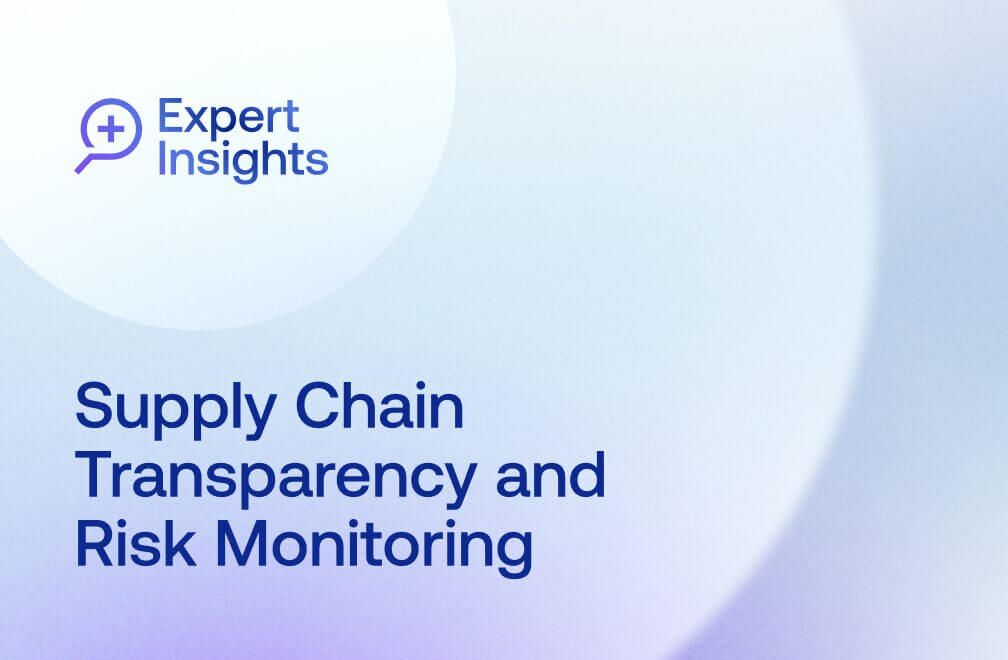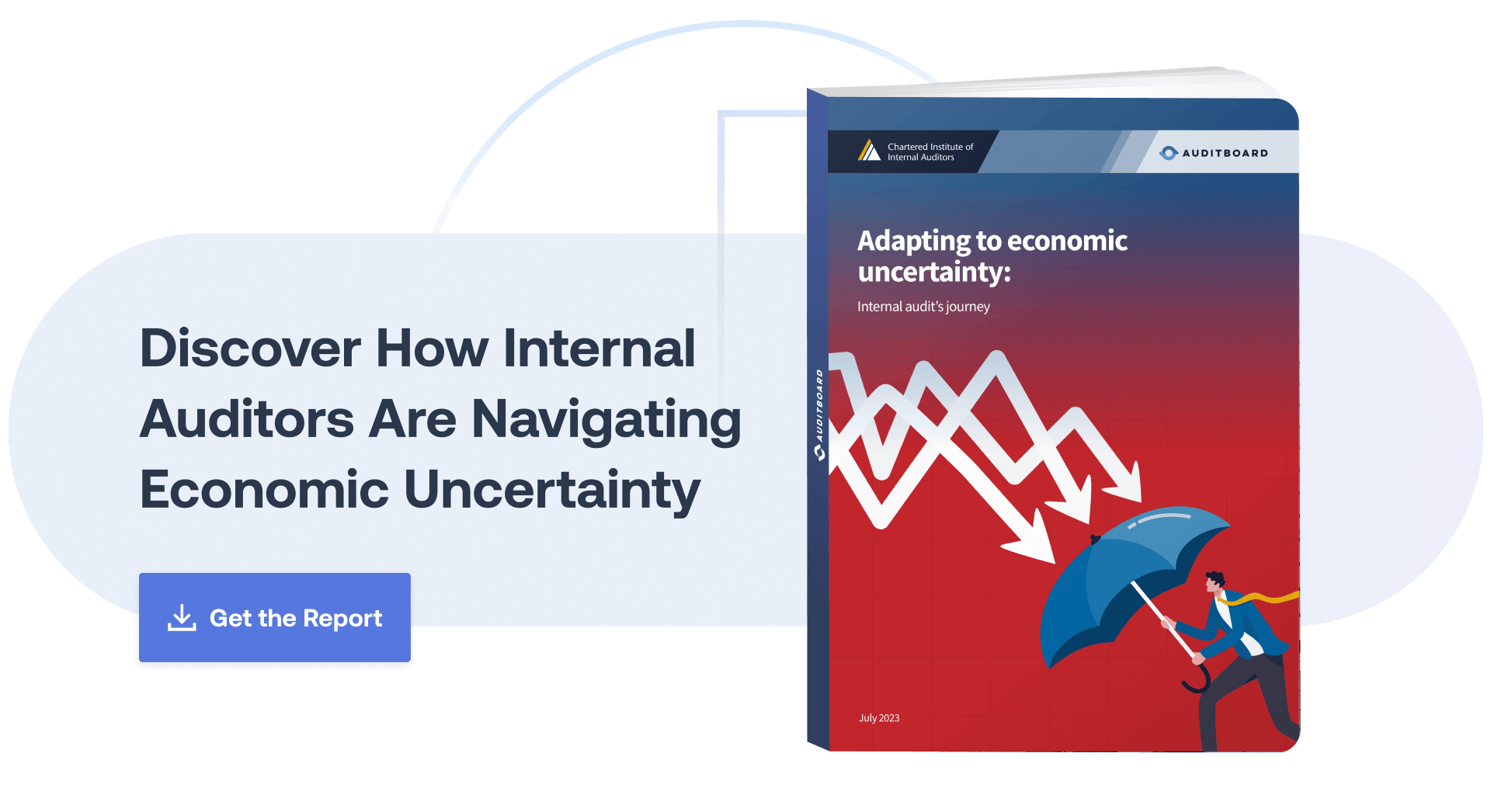
September 13, 2023 • 7 min read
Building Organizational Resilience: Demonstrating Audit’s Value in Times of Economic Recovery
Most organisations don’t realise how resilient they are until after a crisis has passed — which is why the road to recovery holds some of the best growth opportunities for organisations. Whether it be a wash-up meeting, detailed report, or chat by the water cooler with other departments, internal auditors must translate the lessons learnt in times of crisis to fortify their organisation’s resilience in the face of any future crises. By harnessing these valuable learning opportunities, auditors can help build back an even more resilient culture — using lemons to make lemonade.
In a new joint Chartered Institute of Internal Auditors and AuditBoard report, Adapting to Economic Uncertainty: Internal Audit’s Journey, we explore how auditors can leverage their response to economic shocks to drive innovation, growth, and better informed decision-making in the future. Download the full report, watch the video interview below with Richard Chambers (AuditBoard), Carolyn Clarke (Chartered IIA), and Siebrand Wolberink (Deliveroo), and continue reading to learn how internal auditors can make the most of the recovery process.
Driving Innovation and Informed Decision-Making: Internal Audit’s Contribution to Rebuilding and Growth
As organisations navigate the path to recovery and growth, internal auditors are responsible for spotting the weaknesses in their crisis response and turning them into opportunities for improvement. Auditors must therefore pose difficult questions to the business: Are we using all our resources effectively? Are we outsourcing a task that can be done in-house? Spotting these things and alerting the right people can save costs in the long run.
In short, internal audit must be on the ball during times of growth. As auditors uncover opportunities during these growth periods, they can simultaneously demonstrate the value of the internal audit function. In fact, over three-quarters (77.5%) of respondents in a CIIA survey indicated an increase in the perceived value of their internal audit function, reflecting a positive acknowledgement of the function’s contributions amidst economic volatility.
Showing Value: Staying Relevant During Times of Growth
When it is time to seize potential opportunities, be sure to harness key relationships, be proactive with your engagement, and be agile so you can respond to the needs of the organisation. If your organisation is on an acquisition strategy, how is the organisation being acquired set up? Is internal audit engaged in these processes? By holding a mirror up to the organisation that reflects its potential weaknesses, while also providing positive and ongoing assurance, internal audit adds a powerful dimension to the growth strategy.
The following are examples of how internal audit can be proactively engaged in growth opportunities and add value during periods of recovery:
- If your internal audit team has embraced data analytics and AI, but other parts of the organisation have yet to do so, share the story of your digital transformation. This same technology may even be applied to other parts of the organisation. At the very least, your department’s success story can encourage other business team to embrace technology-driven efficiency, benefiting the greater organisation.
- Improve business processes and support cost-cutting measures through your internal audit activities. For example:
Run rebate audits to see if you are receiving the rebates that the organisation is entitled to.
Carry out contract audits to see if contracts with suppliers/contractors are appropriate, cost-effective, and stable.
Review restrictive financial controls that were put in place during a crisis that could be hampering growth. - Run rebate audits to see if you are receiving the rebates that the organisation is entitled to.
- Carry out contract audits to see if contracts with suppliers/contractors are appropriate, cost-effective, and stable.
- Review restrictive financial controls that were put in place during a crisis that could be hampering growth.
- Embrace internal audit’s role as a trusted advisor by actively listening to management’s and the organisation’s needs, while remaining independent and objective. Challenge assumptions or things you think are wrong in your audit engagements. Be committed to being forward-thinking, honest, and objective.
- Enhance your value by providing concise communications, conducting benchmarking work, and delivering training programs. Be an internal audit function that is not only used to put out fires, but also one that highlights opportunities for efficiencies, cost saving etc.
These actions can impact the bottom line of an organisation and contribute to overall growth. By acting on any of these initiatives, internal audit can play a critical role in supporting the rebuilding of organisational resilience and setting the stage for sustainable growth in a challenging economic environment. To learn more effective strategies for building resilience in times of economic uncertainty, download the full report, Adapting to Economic Uncertainty: Internal Audit’s Journey.
You may also like to read


How Uniper achieves greater audit transparency and impact

How Snowflake Uses Continuous Monitoring to Proactively Identify Risk

Enterprise e-commerce company transforms audit planning with Grant Thornton and AuditBoard

How Uniper achieves greater audit transparency and impact

How Snowflake Uses Continuous Monitoring to Proactively Identify Risk
Discover why industry leaders choose AuditBoard
SCHEDULE A DEMO




